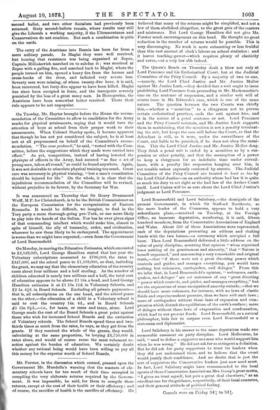The Queen's Bench on Thursday dealt a blow not only
at Lord Penzance and his Ecclesiastical Court, but at the Judicial Committee of the Privy Council. By a majority of two to one, —namely, the Lord Chief Justice and Mr. Justice Mellor against Mr. Justice Lush,—they decided that a writ ought to issue prohibiting Lord Penzance from proceeding in Mr. Mackonochie's case on the sentence of suspension, and a similar writ will of course issue in Mr. Edwards's case, which is one of the same nature. The question between the two Courts was chiefly this,—whether a " monition " to a clergyman not to pursue certain ecclesiastical practices, ends the suit against him, and is in the nature of a penal sentence or not. Lord Penzance and the Privy Council maintain, and Mr. Justice Lush supports them in maintaining, that the monition is not a penalty terminat- ing the suit, but keeps the case still before the Court, so that the defendant is still, as it were, under the surveillance of the Court, and liable to be punished, if he does not obey the moni- tion. This the Lord Chief Justice and Mr. Justice Mellor deny. They think a penal suit is ended by a monition as by a sus- pension or other penalty, and that the assumption of a power to keep a clergyman for an indefinite time under surveil- lance, with a penalty like suspension hanging over him, is not tenable unless expressly conferred by statute. The Judicial Committee of the Privy Council are treated de haut en bas by the Lord Chief Justice—as an authority whose bad law it is quite as much his duty to set right as the bad law of the Arches Court itself. Lord Cairns will be as sore about the Lord Chief Justice's judgment as Lord Penzance.






























 Previous page
Previous page